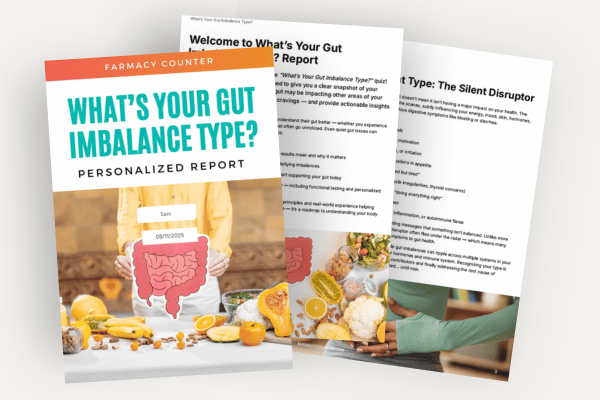
Most of us don’t start the day thinking about microbiomes or gut permeability. We’re focused on what’s right in front of us — why our bellies feel tight, why we’re already tired, or why the clothes that fit last week suddenly feel snug.
You’ve probably heard it all before: everything looks fine on paper, it’s just stress, hormones, or age. Maybe you’ve tried powders and plans, only to feel like you’re running in circles.
That quiet discomfort — digestion off, skin flares for no reason, mood swings that catch you off guard — can feel like a puzzle with no clear answer. From a functional medicine perspective, it’s rarely about a new diagnosis or complicated fixes. It’s about rebalancing your system with foundational, gentle steps that support healing at the root.
Here are five simple tools backed by functional medicine principles that can help your digestion and energy feel steadier each week.
1. Bone Broth — or Mineral-Rich Broth
When digestion feels heavy or meals seem like more work than comfort, broth acts as a gentle anchor. Bone broth is rich in glutamine and glycine, amino acids that support the gut lining and reduce intestinal permeability (aka “leaky gut”).
For those who don’t consume animal products, a slow-simmered veggie broth with seaweed, mushrooms, and miso provides minerals and gut-soothing compounds that support the microbiome and gut barrier integrity.
No need to measure or track — just sip, hands wrapped around the mug, and let the warmth soothe your system.
📌 Recipes from our Kitchen

2. A Castor Oil Pack
This traditional therapy might sound unusual, but it’s a powerful ally for gut and liver health. Placing a warm, castor oil–soaked cloth over your abdomen can help soften tension, improve lymphatic flow, and ease sluggish digestion.
To try it at home:
- Soak a soft flannel cloth in organic castor oil.
- Lay it over your lower abdomen.
- Cover it with plastic wrap or a towel, then place a hot water bottle or heating pad on top.
- Rest for 30–45 minutes while your body absorbs the benefits.
Castor oil packs are a gentle, time-tested way to support detoxification, reduce inflammation, and promote parasympathetic (rest and digest) activity.
📌 We go deeper on this in our blog here.

3. Bitter Greens Before Meals
Modern diets tend to skip over bitter flavors — but these are essential for healthy digestion. Bitters stimulate the vagus nerve and signal your digestive system to start producing stomach acid, bile, and enzymes — the trio responsible for breaking down food and absorbing nutrients.
Try these options before meals:
- Arugula
- Dandelion greens
- Radicchio
- Endive
- Watercress
- Fresh lemon juice
- Apple cider vinegar (1 tsp in water)
- Bitter tinctures (with herbs like gentian or artichoke leaf)
Even just a few bites or sips can improve digestive flow, reduce bloating, and help you feel lighter after eating. In functional medicine, we see bitters as a small but mighty tool for reawakening your digestive fire.

4. Magnesium
Magnesium plays a key role in over 300 biochemical reactions in the body — including those that regulate gut motility, nerve function, and stress response.
- Magnesium citrate supports bowel regularity and is helpful for occasional constipation.
- Magnesium glycinate is calming and more gentle on the stomach — ideal in the evening to help quiet the nervous system and support deeper sleep.
When digestion is sluggish or the nervous system is stuck in “fight-or-flight” mode, magnesium can help bring things back into balance. Try pairing it with warm herbal tea and dim lighting to help your body shift into a parasympathetic (healing) state.
5. Digital Detox
This one’s simple — but essential. Chronic stress is one of the biggest disruptors of gut health. It increases cortisol, slows digestion, and inflames the gut lining. Functional medicine teaches us that healing often happens in the pause — in those moments when your body feels safe and rested.
That’s why a weekly digital detox is such a powerful tool. Once a week (even just for a few hours), try this:
- Turn off all screens — phone, TV, computer.
- Step outside or simply sit quietly indoors.
- Read a real book, take a walk, lie on the grass, or simply do nothing.
This kind of intentional rest helps lower stress hormones, regulate your nervous system, and create the internal conditions your gut needs to repair and rebalance. It’s less about what you do and more about what you don’t do — giving your body the signal that it’s safe to heal.

Taking Your Next Step
Gut health is complex, but the best healing often begins with these foundational, approachable tools. If you’re ready to dive deeper and uncover your unique gut imbalance, take our quick, research-backed quiz:
🧪 Take the 3-minute “What’s Your Gut Imbalance Type?” Quiz here »
You’ll get a free, personalized 7-page report with:
✅ Your primary gut type (and what it means)
✅ Targeted food and lifestyle tips
✅ A smarter, functional medicine approach to gut health and resilience
Because when you understand your gut, you take back control of your energy, mood, digestion, and overall wellbeing.

What’s Your Gut Imbalance Type?
Take our 3-minute quiz to discover your unique gut type — and get a personalized 7-page report with insights and actionable steps to support digestion, energy, mood, and overall gut health.






